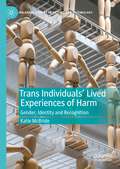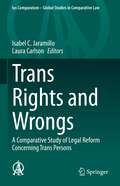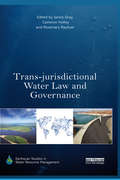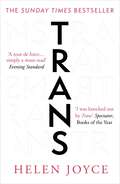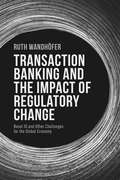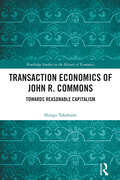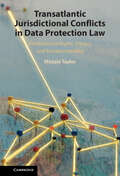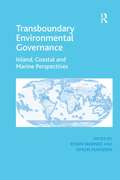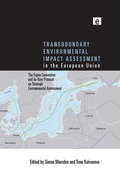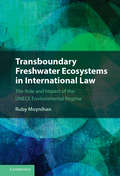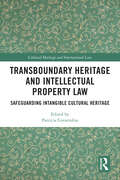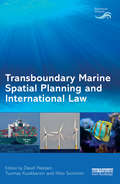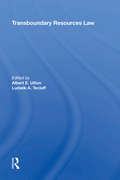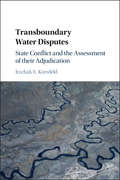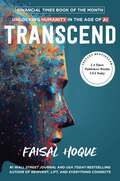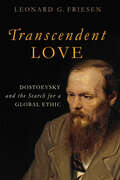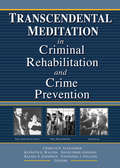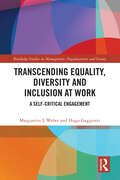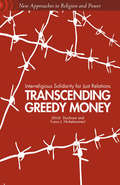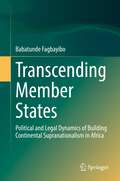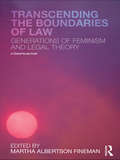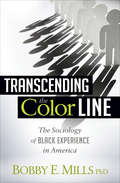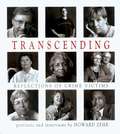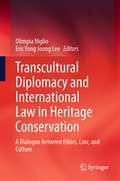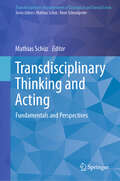- Table View
- List View
Trans Individuals Lived Experiences of Harm: Gender, Identity and Recognition (Palgrave Studies in Victims and Victimology)
by Katie McBrideThis book explores how neoliberal consumer capitalist ideals of meritocracy, competitive individualism, and responsibilisation have shaped trans people’s subjectivity and lived experiences of harm. The book critiques the adequacy of legal constructs of hate crime to acknowledge the social harms experienced. The deep ethnographic data illuminates a variety of social harms that result from the failure of social structures and systems to acknowledge gender identities beyond the binary. The book offers a historically grounded theorisation of anti-trans sentiment to produce a persuasive argument for understanding the harms of hate as recognitive harms. In this sense, the book opens up a path to theorizing the empirically documented emotional and psychological harms of both transphobia and transnormative ideals, as rooted in a binary gender order that has been invigorated by the hyper individualism and competitiveness of capitalist neoliberalism.
Trans Rights and Wrongs: A Comparative Study of Legal Reform Concerning Trans Persons (Ius Comparatum - Global Studies in Comparative Law #54)
by Laura Carlson Isabel C. JaramilloThis book maps various national legal responses to gender mobility, including sex and name registration, access to gender modification interventions, and anti-discrimination protection (or lack thereof) and regulations. The importance of the underlying legislation and history is underlined in order to understand the law’s functions concerning discrimination, exclusion, and violence, as well as the problematic nature of introducing biology into the regulation of human relations, and using it to justify pain and suffering. The respective chapters also highlight how various governmental authorities, as well as civil society, have been integral in fostering or impeding the welfare of trans persons, from judges and legislators, to medical commissions and law students. A collective effort of scholars scattered around the globe, this book recognizes the international trend toward self-determination in sex classification and a generous guarantee of rights for individuals expressing diverse gender identities. The book advocates the dissemination of a model for the protection of rights that not only focuses on formal equality, but also addresses the administrative obstacles that trans persons face in their daily lives. In addition, it underscores the importance of courts in either advancing or obstructing the realization of individual rights.
Trans-jurisdictional Water Law and Governance (Earthscan Studies in Water Resource Management)
by Janice Gray Cameron Holley Rosemary RayfuseGovernance of global water resources presents one of the most confounding challenges in contemporary natural resource governance. With considerable government, citizen and financial donor attention devoted to a range of international, transnational and domestic laws and policies aimed at protecting, managing and sustainably using fresh and coastal marine water resources, this book proposes that sustainable water outcomes require a ‘trans-jurisdictional’ approach to water governance. Focusing on the concept of trans-jurisdictional water governance the book diagnoses barriers and identifies pathways to coherent and coordinated institutional arrangements between and across different bodies of laws at local, national, regional and international levels. It includes case studies from the European Union, Australia, New Zealand, South Africa, the United States and Southeast Asia. Leading specialists offer insights into the pretence and the promise of trans-jurisdictional water governance and provide readers, including students, practitioners, policy-makers and academics, with a basis for better analysing, articulating and synthesising standards of good trans-jurisdictional water governance both in theory and in practice.
Trans: When Ideology Meets Reality
by Helen Joyce&‘There are few subjects which need treatment that is at once delicate, thoughtful and brave. Helen Joyce manages all of these things in Trans. Anyone looking to understand this most fraught of issues should start here.&’ Douglas Murray, author of The Madness of Crowds Gender identity ideology is about more than twitter storms and using the right pronouns. In just ten years, laws, company policies, school and university curricula, sport, medical protocols, and the media have been reshaped to privilege self-declared gender identity over biological sex. People are being shamed and silenced for attempting to understand the consequences of redefining &‘man&’ and &‘woman&’. While compassion for transgender lives is well-intentioned, it is stifling much-needed inquiry into the significance of our bodies, particularly with regard to women&’s rights, fairness in sport, same sex attraction and children&’s development. If we recommit to our liberal values of freedom of belief, freedom of speech and robust debate, we stand a chance of addressing what is at stake.
Transaction Banking and the Impact of Regulatory Change: Basel III and Other Challenges for the Global Economy
by R. WandhöferThis book takes you on a journey through post-crisis regulatory reform, highlighting the unintended consequences of some of the measures on transaction banking, a business that provides the backbone of financial markets.
Transaction Economics of John R. Commons: Towards Reasonable Capitalism (Routledge Studies in the History of Economics)
by Shingo TakahashiTakahashi reconstructs the key blocks of one of the founders of the institutional school, John R. Commons’ theories of the evolution of capitalism and of institutional change by taking the concept of transaction as a central point of departure.Commons’ theories continue to influence modern economics, and in this book, Takahashi scrutinizes his construction of transaction and its features and offers a reinterpretation of Commons’ institutional economics and transaction economics. He then explores how Commons’ analysis of going concerns (e.g., firms) has broader and deeper applications that extend to monetary policy, labor policy, and the business cycle. Takahashi examines how Commons’ and Veblen’s dynamic theories share cumulative causation. He closes by positing that Commons’ transaction economics seeks “reasonable capitalism” through a virtuous cycle of reasonable value and generation of good business ethics.This book will be attractive to researchers of institutional economics, political economy, heterodox economics, as well as the history of economic thought, law, and ethics.
Transatlantic Jurisdictional Conflicts in Data Protection Law: Fundamental Rights, Privacy and Extraterritoriality
by Mistale TaylorThis book looks at transatlantic jurisdictional conflicts in data protection law and how the fundamental right to data protection conditions the EU's exercise of extraterritorial jurisdiction. Governments, companies and individuals are handling ever more digitised personal data, so it is increasingly important to ensure this data is protected. Meanwhile, the Internet is changing how territory and jurisdiction are realised online. The EU promotes personal data protection as a fundamental right. Especially since the EU's General Data Protection Regulation started applying in 2018, its data protection laws have had strong effects beyond its territory. In contrast, similar US information privacy laws are rooted in the marketplace and carry less normative heft. This has provoked clashes with the EU when their values, interests and laws conflict. This research uses three case studies to suggest ways to mitigate transatlantic jurisdictional tensions over data protection and security, the free flow of information and trade.
Transboundary Environmental Governance: Inland, Coastal and Marine Perspectives
by Simon MarsdenEffective protection of the marine and terrestrial environment increasingly requires cooperation between neighbouring States, international organizations, government entities and communities within States. This book analyses key aspects of transboundary environmental law and policy and their implementation in Asia, Australasia and Australian offshore territories, and surrounding areas beyond national jurisdiction including Antarctica. It discusses the potential for implementing key transboundary environmental mechanisms such as the 1991 Convention on Environmental Impact Assessment in a Transboundary Context (Espoo Convention) and its 1997 Protocol on Strategic Environmental Assessment (Kiev Protocol) in Australia and Asia drawing on experience from other regions and the potential application of these agreements to all UN member states. The book makes an innovative contribution to research in the area of transboundary environmental governance particularly as it applies to Asia, Australasia and international areas, supplementing similar research which has predominantly focused on Europe and North America.
Transboundary Environmental Impact Assessment in the European Union: The Espoo Convention and its Kiev Protocol on Strategic Environmental Assessment
by Timo Koivurova Simon MarsdenThis book examines 'The Espoo Convention on Environmental Impact Assessment in a Transboundary Context', which celebrates the twentieth anniversary of its adoption in 2011, and its 'Kiev Protocol on Strategic Environmental Assessment' which came into force in July 2010. In addition to contributing to international environmental law, the Convention has prompted significant changes to European environmental law. The chapters in this collection explain the role of transboundary environmental impact assessment in international and European law, and explore the relationship between international and European law in the context of potential application of the Convention. They also examine examples of the Convention in practice, and consider the potential application of the Protocol. While the focus of the book is on the situation in the European Union, reference is made to the relationship between EU and non-EU member states, notably in connection with important cases in the Arctic, the Danube Delta and the Baltic Sea.
Transboundary Freshwater Ecosystems in International Law: The Role and Impact of the UNECE Environmental Regime
by Ruby MoynihanA global water crisis with far-reaching and interconnected environmental, social, health and economic impacts threatens the world. Healthy ecosystems and ecosystem services are degrading, and access to a sustainable water supply is increasingly inequitable both within and between States. This book demonstrates how to overcome the global freshwater ecosystem crisis by matching the scientific recommendations with an international legal framework fit for the task, which re-orientates international water law towards a stronger ecosystem approach that also protects vulnerable societies. It illustrates how to understand the fragmented legally binding and non-binding instruments of the United Nations Economic Commission for Europe environmental treaties as one coherent legal regime, which contributes to strengthening general rules and principles of the law concerning transboundary freshwater ecosystems. With the recent global opening of the UNECE regime, this book explores its potential role within the European region, Central Asia, Caucasus, Africa, the Middle East and beyond.
Transboundary Heritage and Intellectual Property Law: Safeguarding Intangible Cultural Heritage (Routledge Studies in Cultural Heritage and International Law)
by Patricia CovarrubiaSince the Intangible Heritage Convention was adopted by UNESCO in 2003, intangible cultural heritage has increasingly been an important subject of debate in international forums. As more countries implement the Intangible Heritage Convention, national policymakers and communities of practice have been exploring the use of intellectual property protection to achieve intangible cultural heritage safeguarding outcomes. This book examines diverse cultural heritage case studies from Indigenous communities, and local communities developing and industrialised countries to offer an interdisciplinary examination of topics at the intersection between heritage and property which present cross-border challenges. Analysing a range of case studies which provide examples of traditional knowledge, traditional cultural expressions, and genetic resources by a mixture of practitioners and scholars from different fields, the book addresses guidelines and legislation as well as recent developments about shared heritage to identify a progressive trend that improves the understanding of intangible cultural heritage. Considering all forms of intellectual property, including patents, copyright, design rights, trademarks, geographical indications, and sui generis rights; the book explores problems and challenges for intangible cultural heritage in cross borders situations, as well as highlighting positive relationships and collaborations among communities across geographical boundaries. Transboundary Heritage and Intellectual Property Law: Safeguarding Intangible Cultural Heritage will be an important resource for practitioners, scholars and students engaged in studying intangible cultural heritage, intellectual property law, heritage studies and anthropology.
Transboundary Marine Spatial Planning and International Law (Earthscan Oceans)
by Daud Hassan Tuomas Kuokkanen Niko SoininenMarine Spatial Planning (MSP) is an integrated and comprehensive approach to ocean governance and is used to establish a rational use of marine space and reconcile conflicting interests of its users. MSP allows both a high level of environmental protection and a wide range of human activities and emphasizes coordinated networks of national, regional and global institutions. This book focuses on the framework of international law behind MSP and especially on the transboundary aspects of MSP. It first sets out a general framework for transboundary MSP and then moves on to compare and assess differences and similarities between different regions. Specific detailed case studies include the EU with the focus on the Baltic Sea and North Sea, the Bay of Bengal and Great Barrier Reef in Australia. The authors examine the national and regional significance of MSP from an integrated and sustainable ocean governance point of view. They also show how transboundary MSP can create opportunities and positive initiatives for cross-border cooperation and contribute to the effective protection of the regional marine environment.
Transboundary Resources Law
by Albert UttonOriginally published in 1987, this is a collection of articles on Transboundary Resources Law. From the preface: “Migratory transboundary resources by their nature of being divided by political boundaries raise unusual challenges to their prudent use and development, and the avoidance of disputes over their use. One only has to recall examples, s
Transboundary Water Disputes: State Conflict and the Assessment of their Adjudication
by Itzchak E. KornfeldOne of the most challenging aspects of climate change has been the increased pressure on water resources limited by droughts and new rain patterns, which has been exacerbated by rapid modernization. Due to these realities, disputes across national borders over use and access to water have now become more commonplace. This study analyzes the history and adjudication of transboundary water disputes in five international courts and tribunals, two US Supreme Court cases, and boundary water disputes between the United States and Canada and the United States and Mexico. Explaining the circumstances and outcomes of these cases, Kornfeld asks how effective the courts and tribunals have been in adjudicating them. What kind of remedies have they fashioned and how have they dealt with polycentric and sovereignty issues? This timely work examines the doctrine of equitable allocation of transboundary water resources and how this norm can be incorporated into international law.
Transcend: Unlocking Humanity in the Age of AI
by Faisal HoqueThe question this book answers is, how can we use AI to unlock humanity&’s full potential while protecting what is most precious about the human experience?As humanity takes its first steps into the Age of Artificial Intelligence, we are only just beginning to think through the possibilities and the dangers this technology brings. But we do not have time for leisurely speculation. AI will overturn the world we know in our lifetimes, and we must prepare ourselves to meet the unprecedented changes that will soon be upon us. In Transcend: Unlocking Humanity in the Age of AI, Faisal Hoque, one of the world&’s leading management thinkers and technologists, and a bestselling author, provides readers with the road maps they need to tackle the most important questions of our generation. · A unique perspective that emerges at the intersection of philosophy, humanity, business, and technology · Powerful practical frameworks to guide the reader in thinking about and using AI · The OPEN framework for unlocking the potential of AI · The CARE framework for protecting against its dangers · Structured approaches to AI tailored for individuals, businesses, and government agencies
Transcendent Love: Dostoevsky and the Search for a Global Ethic
by Leonard G. FriesenIn Transcendent Love: Dostoevsky and the Search for a Global Ethic, Leonard G. Friesen ranges widely across Dostoevsky's stories, novels, journalism, notebooks, and correspondence to demonstrate how Dostoevsky engaged with ethical issues in his times and how those same issues continue to be relevant to today's ethical debates. Friesen contends that the Russian ethical voice, in particular Dostoevsky's voice, deserves careful consideration in an increasingly global discussion of moral philosophy and the ethical life. Friesen challenges the view that contemporary liberalism provides a religiously neutral foundation for a global ethic. He argues instead that Dostoevsky has much to offer when it comes to the search for a global ethic, an ethic that for Dostoevsky was necessarily grounded in a Christian concept of an active, extravagant, and transcendent love. Friesen also investigates Dostoevsky's response to those who claimed that contemporary European trends, most evident in the rising secularization of nineteenth-century society, provided a more viable foundation for a global ethic than one grounded in the One, whom Doestoevsky called simply "the Russian Christ." Throughout, Friesen captures a sense of the depth and sheer loveliness of Dostoevsky's canon.
Transcendental Meditation® in Criminal Rehabilitation and Crime Prevention
by Kenneth G Walton David Orme-Johnson Rachel S GoodmanIn contrast to the generally dismal results of various approaches to rehabilitation, these consciousness-based strategies have proven effective in preventing crime and rehabilitating offenders! This book will introduce you to a powerful, unique approach to offender rehabilitation and crime prevention. In contrast to the generally dismal results of most rehabilitation approaches, studies covering periods of 1-15 years indicate that this new approach-employing the Maharishi Transcendental Meditation® and TM-Sidhi programs-reduces recidivism from 35-50%. Transcendental Meditation® in Criminal Rehabilitation and Crime Prevention provides the reader with a theoretical overview, new original research findings, and examples of practical implementation. With this book, you will explore what motivates people to commit crimes, with emphasis on stress and restricted self-development. Then you'll examine the results and policy implications of applying these consciousness-based techniques to offender rehabilitation and crime reduction. Most chapters include tables or figures that make the information easy to understand. Transcendental Meditation® in Criminal Rehabilitation and Crime Prevention does not merely review the theory behind this innovative approach to rehabilitation and prevention but also emphasizes the practical value of the programs it describes and reports how techniques and strategies based on Transcendental Meditation® have been put to use in a variety of settings. This book will familiarize the reader with: a rehabilitation approach so universal in its applicability that any adult or juvenile offender can begin it at the point of sentencing, during incarceration, or at the point of parole the in-depth background on adult growth and higher states of consciousness necessary to understand this consciousness-based, developmental approach the results of empirical studies conducted in prisons around the country, with up to 15 years of follow-up a preview of how cost-effective the rehabilitation program might be implications for public policy and the judicial system-including an innovative alternative sentencing program how this approach deals not only with individuals but also with the community as a whole-when practiced by a small percentage of the population, the TM and TM-Sidhi programs may reduce crime in the larger community how these society-level prevention programs may prove to be effecitive in reducing not only school violence in the community but, if applied on sufficient scale, war deaths and terrorism in the greater society
Transcending Equality, Diversity and Inclusion at Work: A Self-Critical Engagement (Routledge Studies in Management, Organizations and Society)
by Hugo Gaggiotti Marguerite L WeberThe book reflects on ways of transcending Equality, Diversity and Inclusion (EDI) by establishing a dialogue between the professional experience of the authors and experts from academia and practitioners from financial services and executive search. The book emphasises the link and impact between what is taught and what is learned about EDI and how this reflects on later choices in career and workplace status. The book offers a critical and global perspective, emphasizing the multilocality and intersectionality dimension of diversity and unpicks key insights from different conceptualizations, like class, gender and postcolonialism and their relationship with the current paradigm of diversity and how people identify and communicate. With an extensive collection of testimonies and invitations for reflection, the book doesn’t limit the analysis to the influences of historical power relations in the workplace, but investigates at what stage multicultural power structures start developing a compulsory inclination to create “differences” and how this can influence hiring decision making and management in the workplace. In the book, academics and practitioners provide illumination and insights gleaned from their own personal experiences and perspectives. Whilst the research targeted financial services and executive search, the book's findings will appeal globally to individuals of all age groups regardless of educational status, seniority or in which industry they are employed, particularly those who are aware of how each one expresses similarity and differences sometimes in not obvious ways.
Transcending Greedy Money
by Ulrich Duchrow Franz J. HinkelammertThis major work offers an historical description and systematic analysis of the root causes of this global economic crisis, which the authors understand as a crisis of western civilization, and provides a comprehensive solution based on theological social justice.
Transcending Member States: Political and Legal Dynamics of Building Continental Supranationalism in Africa
by Babatunde FagbayiboThis book explores innovative and context-driven political and legal policy measures designed to expand the powers of the African Union (AU) in order to meaningfully drive the continental integration process. In this regard, the book addresses issues of context, political will, and innovative and inclusive approaches as essential elements that must be considered. Africa is currently experiencing one of the most critical phases of its integrative development. Since 2015, there have been increasing efforts to develop policies and practices that grant the AU broader powers to coordinate and create binding rules regarding the regional integration process. In other words, these processes seek to endow the AU with supranational powers like those exercised by the European Union, which, despite its internal problems, remains the most successful experiment in supranationalism in the world. This has included the decision to finance the AU through a 0.2% tax on eligible imports into member states; the decision to reduce the number of AU Commission portfolios from eight to six; the adoption and entry into force of the much touted Agreement establishing the African Continental Free Trade Area; the adoption of the Protocol to the Treaty Establishing the African Economic Community Relating to Free Movement of Persons, Right to Residence and Right of Establishment; and the adoption of the AU Agenda 2063 policy framework in 2015. How these processes will change the direction of regional integration in Africa, the book argues, largely depends on the existence of quality-driven institutions.
Transcending the Boundaries of Law: Generations of Feminism and Legal Theory
by Martha Albertson FinemanTranscending the Boundaries of Law is a ground-breaking collection that will be central to future developments in feminist and related critical theories about law. In its pages three generations of feminist legal theorists engage with what have become key feminist themes, including equality, embodiment, identity, intimacy, and law and politics. Almost two decades ago Routledge published the very first anthology in feminist legal theory, At the Boundaries of Law (M.A. Fineman and N. Thomadsen, eds. 1991), which marked an important conceptual move away from the study of "women in law" prevalent in the 1970s and 1980s. The scholars in At the Boundaries applied feminist methods and theories in examining law and legal institutions, thus expanding upon work in the Law and Society tradition. This new anthology brings together some of the original contributors to that volume with scholars from subsequent generations of critical gender theorists. It provides a "retrospective" on the past twenty-five years of scholarly engagement with issues relating to gender and law, as well as suggesting directions for future inquiry, including the tantalizing suggestion that feminist legal theory should move beyond gender as its primary focus to consider the theoretical, political, and social implications of the universally shared and constant vulnerability inherent in the human condition.
Transcending the Color Line: The Sociology of Black Experience in America
by Bobby E. MillsA moral and philosophical approach to the stubborn problem of racism. Transcending the Color Line by sociologist and professor Bobby E. Mills, PhD, represents a philosophical attempt to make sense out of American black collective experience. These essays do not reflect traditional sociological perspectives and methodological considerations. Instead, the query is: How do we live? And more importantly, what are we willing to sacrifice in order to live the way we say we want to live? In other words, this collection digs deeper into the moral and spiritual issues that lie beneath the more obvious sociological ones. Invariably the search for moral understanding and spiritual meaning is neither easy nor popular. Yet it is the abstract, empirical (amoral and apolitical) character of traditional sociology that has all but rendered it irrelevant to the resolution of contemporary social ills. The biased theoretical assumptions of the scientific method (i.e., abstract empiricism) are the social basis for the collective bias otherwise known as the illusion of value neutrality. This collective cultural bias is the social foundation for institutional racism, sexism, theological dogmatism (i.e., denominationalism), and above all, authoritarianism. Indeed, every &“ism&” is a schism, and schisms divide. Our either/or logic fosters cultural extremism rather than a universal perspective on humanity. By digging deep to the true source of our sociological and leadership issues, these essays not only call black and white individuals accountable to the dysfunction present in our shared social experience, but inspire all people to transcend the color line and become part of the solution.
Transcending: Reflections Of Crime Victims
by Howard ZehrAre victims of crime destined to have the rest of their lives shaped by the crimes they've experienced? ("What happened to the road map for living the rest of my life?" asks a woman whose mother was murdered.) Will victims of crime always be bystanders in the justice system? ("We're having a problem forgiving the judge and the system," says the father of a young man killed in prison.) Is it possible for anyone to transcend such a comprehensively destructive, identity altering occurrence? ("I thought, I'm going to run until I'm not angry anymore," expresses a woman who was assaulted.) Howard Zehr presents the portraits and the courageous stories of 39 victims of violent crime in Transcending: Reflections of Crime Victims. Many of these people were twice-wounded: once at the hands of an assailant; the second time by the courts, where there is no legal provision for a victim's participation. "My hope," says Zehr, "is that this book might hand down a rope to others who have experienced such tragedies and traumas, and that it might allow all who read it to live on the healing edge."
Transcultural Diplomacy and International Law in Heritage Conservation: A Dialogue between Ethics, Law, and Culture
by Olimpia Niglio Eric Yong Joong LeeThis book provides a substantial contribution to understanding the international legal framework for the protection and conservation of cultural heritage. It offers a range of perspectives from well-regarded contributors from different parts of the world on the impact of law in heritage conservation. Through a holistic approach, the authors bring the reader into dialogue around the intersection between the humanities and legal sciences, demonstrating the reciprocity of interaction in programs and projects to enhance cultural heritage in the world. This edited volume compiles a selection of interesting reflections on the role of cultural diplomacy to address intolerances that often govern international relations, causing damage to human and cultural heritage. The main purpose of this collection of essays is to analyse the different cultural paradigms that intervene in the management of heritage, and to advocate for improvements in international laws and conventions to enable better cultural policies of individual nations for the protection of human rights. The editors submit that it is only through open dialogue between the humanities and jurisprudence that the international community will be able to better protect and value sovereignty, and promote cultural heritage for the development of a better world. This collection is relevant to scholars working in areas relating to law, management and policies of cultural heritage conservation and protection.
Transdisciplinary Thinking and Acting: Fundamentals and Perspectives (Transdisciplinary Management of Ecological and Social Crises)
by Mathias SchüzComplex problems can only be overcome with complex solutions. This dictum by Albert Einstein also applies to current world problems such as climate change, species extinction, the littering of our planet, and the growing gap between rich and poor. They overwhelm individual scientific disciplines. Therefore, they can only be solved through transdisciplinarity, i.e. beyond the individual disciplines in interaction with empirical knowledge of different provenance and philosophical reflection. This first volume of the book series "Transdisciplinary Management of Social and Ecological Crises" explains how transdisciplinarity is to be understood in general, what approaches exist, and how they contribute to solving the various world problems. In this context, the book addresses, among other things, the replacement of man's claim to dominion over nature, the overcoming of culturally determined boundaries in human communities, and integrative and agile management methods in business, politics, art, and society. It deals with a sustainable circular economy, new forms of politics in the interest of all instead of a few, learning from artists, healthy and environmentally sound nutrition, and spiritual mindfulness in dealing with oneself and other ways of life. Thus, the book is aimed at a broad audience from different disciplines interested in the perspective of and interaction with other disciplines to solve global problems. Chapter "Methodology of Transdisciplinarity–Levels of Reality, Logic of the Included Middle and Complexity" is available open access under a Creative Commons Attribution 4.0 International License via link.springer.com.
